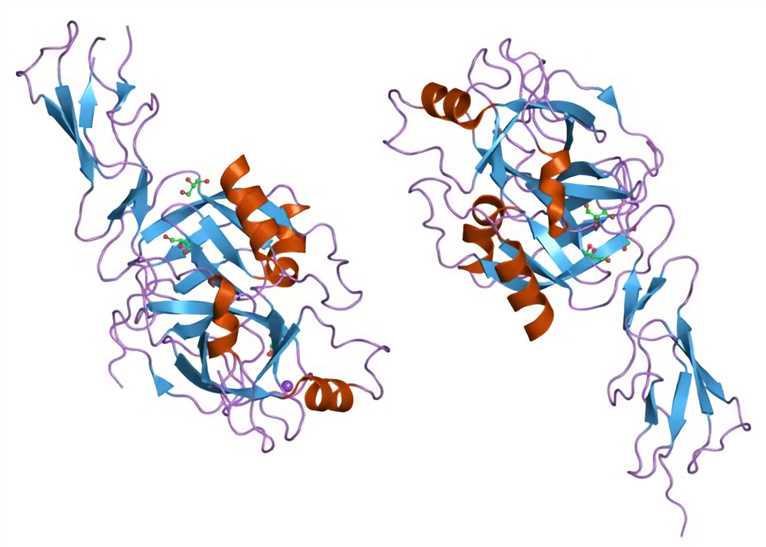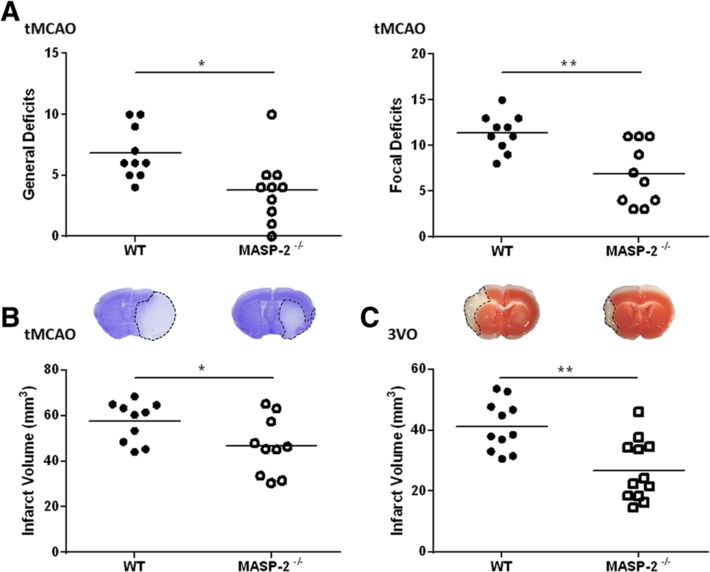MASP-2 is an enzyme encoded by the MASP2 gene in humans and it participates in the complement system. Uncontrolled or inappropriate activation of the complement system can lead to diseases with severe tissue damage. Inhibition of MASP-2 does not interfere with the classical antibody-dependent complement activation pathway and thus may serve as a key component of therapeutic development.
For years, Creative Biolabs has consistently and effectively supported the anti-complement therapy industry with a unique range of products and related services. In terms of our extensive experience in complement therapeutic, we provide a variety of biotherapeutics development services for complement therapeutic target-MASP-2.
MASP-2
Mannan-binding lectin serine protease 2 also known as mannose-binding protein-associated serine protease 2 (MASP-2), is an enzyme encoded by the MASP2 gene in humans. The encoded preprotein is proteolytically processed to produce A and B chains that heterodimerize to form the mature protease. MASP-2 shares a common ancestor with the C1s molecules of the classical complement pathway and is therefore very similar. This enzyme cleaves complement components C2 and C4 in order to generate C3 convertase in the lectin pathway of the complement system. It is also important in the coagulation cascade through cleavage of prothrombin to form thrombin. Serum levels of the encoded protein are low in patients with acute stroke and myocardial infarction.
 Distributed under Public Domain, from Wiki,
without modification.
Distributed under Public Domain, from Wiki,
without modification.
Fig.1 Molecular structure of MASP-2.
The Role of MASP-2 in Chemotherapy-induced Neutropenia
MASP-2 is an essential component of the complement-activated lectin pathway. Its deficiency is common due to genetic polymorphisms, but its impact on susceptibility to infection remains to be studied. MBL and ficolins both activate MASP-2, resulting in bacterial death by complement activation. The defect of the complement-activated lectin pathway is a major cause of innate immunity that occurs frequently due to polymorphisms and may affect individual susceptibility to infection. It has been proved that patients with cancer and MASP-2 deficiency develop more frequent or more severe episodes of fever and severe chemotherapy-induced neutropenia (FN).
The Role of MASP-2 in Septic Shock
Septic shock is an important clinical condition with high mortality. Complement components 3 and 5 (C3 and C5) are involved in the development of septic shock. Both the classical pathway and the alternative pathway seem to be activated in septic shock, but the alternative pathway may be activated earlier than the classical pathway. Activation of these two pathways is crucial for clearance of endotoxins. Recent investigations have elucidated the role of lectin complement pathway in septic shock and that mannose-binding lectin (MBL) has a protective effect on sepsis. A preliminary study of MASP-2 in patients with septic shock showed that an acute decline in early MASP-2 in septic shock may be related to in-hospital mortality.
Drug Development Service for MASP-2 at Creative Biolabs
The essential functions for the activation of complement lectin pathway and close association with multiple indications endow MASP-2 great potential for novel drug development. Recently, a human monoclonal antibody specifically against MASP-2, has been clinically evaluated as a MASP-2 inhibitor for the treatment of IgA nephropathy, atypical hemolytic uremic syndrome, stem cell transplant-associated thrombotic microangiopathy, and other related disorders. More importantly, this MASP-2 antibody has been shown rapidly and continuously decreased the levels of inflammatory biomarkers and remarkably reduced mortality of 2019-coronavirus infection, exhibiting a great therapeutic potential against 2019-coronavirus disease.
As one of the most highly respected drug discovery and antibody development laboratories in the world, Creative Biolabs has been helping customers all over the world make fast and effective biotherapeutics development decisions for decades. Based on integrated platforms, we provide high-quality custom drug development services for MASP-2, including recombinant protein expression and purification, monoclonal and polyclone antibody development, aptamer screening, small molecules inhibitor screening...Our scientists, technicians, and regulatory experts are committed to assisting your research with our complement-based R&D services. Please contact us for more information and a detailed quote.
Published Data
 Fig.2 Protective role of MASP-2 deficiency in cerebral ischemia-reperfusion injury.1
Fig.2 Protective role of MASP-2 deficiency in cerebral ischemia-reperfusion injury.1
The lectin activation pathway (LP) emerges as a pivotal player in post-ischemic tissue inflammation, a major cause of ischemia-reperfusion injury impacting ischemic disease outcomes. This study elucidates the role of LP-associated enzymes MASP-1, MASP-2, and MASP-3 in ischemic brain injury using stroke mouse models. Wild-type and complement-deficient mice were subjected to cerebral ischemia, receiving systemic MASP-2 antibody treatment to ensure effective inhibition. Results showed that MASP-2-deficient and MASP-2 antibody-treated mice exhibited reduced neurological deficits and histopathological damage. Conversely, MASP-1/3 deficiency offered no protection. Findings highlight MASP-2's central role in cerebral ischemia-reperfusion injury, challenging views of MASP-1 as the primary pathway activator.
Reference
-
Orsini, Franca, et al. "Mannan binding lectin-associated serine protease-2 (MASP-2) critically contributes to post-ischemic brain injury independent of MASP-1." Journal of neuroinflammation 13 (2016): 1-13. Distributed under Open Access license CC BY 4.0, without modification.
Related Product
Questions & Answer
A: Targeting MASP-2 offers advantages since it specifically modulates the lectin pathway of the complement system. By targeting MASP-2, researchers can potentially achieve a more focused and controlled approach to complement inhibition, minimizing off-target effects while addressing diseases associated with lectin pathway dysregulation.
A: Biomarkers associated with MASP-2-related diseases are an active area of research. Elevated levels of MASP-2 or other complement components in patient samples, along with genetic markers, may serve as diagnostic tools or indicators of diseases. Researchers are working to identify reliable biomarkers for various MASP-2-associated conditions.
A: Future research in MASP-2-targeted complement therapy should focus on refining the therapeutic strategies, conducting long-term safety studies, and exploring novel approaches to improve the selectivity and effectiveness of MASP-2 inhibition. Additionally, investigating the role of MASP-2 in emerging diseases and conditions may uncover new therapeutic opportunities.
For Research Use Only.
Related Sections:


 Fig.2 Protective role of MASP-2 deficiency in cerebral ischemia-reperfusion injury.1
Fig.2 Protective role of MASP-2 deficiency in cerebral ischemia-reperfusion injury.1